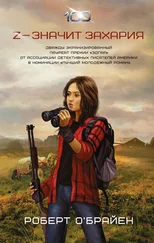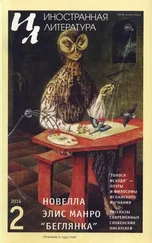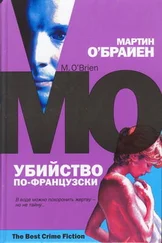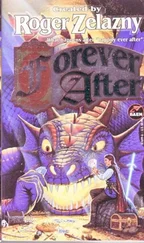I suppose he heard the two gunshots, and that’s what brought him back. I was watching at the time. It was about one-thirty and the man, wearing his blue coverall—he did not put the plastic suit back on—had cleaned the chicken with a knife from his wagon and was cooking it on a spit he had made. The dog came up very cautiously and stood at the edge of the front garden, watching and sniffing. When the man looked up and saw him he stopped turning the spit and stared, not moving. Then he took a step towards Faro, and Faro backed away. The man crouched down, slapped his knee, whistled, and said something; I could hear the whistle but not the words. I knew he was calling him, though; he wanted to make friends with him. He walked forward again, and Faro backed away, keeping the same distance between them.
The man gave up and went back to the fire. That is, he seemed to have given up, but he had not really, I could tell. He had an idea, a very simple one, and he kept looking up to see if the dog was still there. When the chicken was cooked, just a few minutes later, he went into the house and came out with two plates (mine!). He cut off a big chunk of chicken. He opened a tin from the store-box, some kind of meat. He put the chicken and some of the meat on one plate and carried it, moving very gently, past the edge of the garden to about where the dog had first appeared. And he put it down there.
Back to his spit he went, very unconcerned, and carved up his chicken and ate it, along with some kind of dried bread he took from his wagon. (I could have given him some fresh-baked cornbread.) He ate the whole chicken, very quickly too, and as he ate he watched the dog from the corner of his eye. Faro crept up, looking at the man, then the plate of food, then the man again, until finally he reached it. Standing as far back as he could he stretched out his neck, snatched the chicken and ran back fifty feet. He swallowed it in two gulps, came back for the other meat and did the same again.
Having eaten, the dog came back to the plate, licked it, and then slowly began circling the garden, sniffing as he went, still keeping away from the man. He went all the way round the house twice. Then, to my horror, he started wagging his tail the way he used to when he was tracking, and he turned from the house and headed up the hill towards the cave. He had found my tracks.
The man stared after him as he left, whistled loudly, and started to follow. But the dog was out of sight by then, and he gave up after a few steps. Fortunately the area between the house and the cave has a lot of trees and underbrush, so I am quite sure there was no glimpse of the dog after that. I crept back into the cave and in two minutes Faro came bounding in.
Poor dog. He looked terrible, even worse close up, even in the dimness of the cave. He gave two short, creaky little barks and ran to me. But I was scared. Inevitably, if he stayed around, if the man made friends with him, he was going to betray me. So I did not know what to do; I did not dare act too friendly. I said in a whisper, “ Good Faro,” but I did not hug him the way I felt like doing. The truth is, though I liked him and he liked me, it was not me he was looking for anyway. He had been in the cave a thousand times before when we played there, and now he ran around it sniffing everything, looking for David. When he did not find him he left again in just a few minutes, and ran back down the hill, towards the house.
It is trouble, because that’s where the man is, and the plate, and the food. If the man makes friends with him, he will come to a whistle, as he did for David; the man can keep him close, and follow him when he comes up here.
I suppose it seems wrong to be so afraid of that. It is just that I don’t know what the man will do. I liked most people. I had a lot of friends at school, and a boy friend, too. But that was a matter of choice; there were some people I didn’t like, and many that I didn’t even know. This man may be the only man left on the earth. I don’t know him. Suppose I don’t like him? Or worse, suppose he doesn’t like me?
For nearly a year I have been here alone. I have hoped and prayed for someone to come, someone to talk to, to work with, and plan for the future in the valley. I dreamed that it would be a man, for then, some time in the future—it is a dream, I know—there might be children in the valley. Yet, now that a man has actually come, I realize that my hopes were too simple. All men are different, but the man on the radio station, fighting to survive, saw people that were desperate and selfish. This man is a stranger, and bigger and stronger than I am. If he is kind, then I am all right. But if he is not—what then? He can do whatever he likes, and I will be a slave for the rest of my life. That is why I want to find out, at least as well as I can by watching him, what he is like.
After the dog left the cave, after it had been gone a while, I went back to the entrance and looked down at the house. The man had scissors in his hand, a small mirror propped in front of him, and was cutting his hair and his beard. He kept at it for a long time, and trimmed them both quite short. I must admit it made a great improvement; he looks almost handsome, though he got the hair rather lopsided at the back, where he could not see it in the mirror.
May 26th
A sunny day, like yesterday only warmer. According to my calendar (I have it and the alarm clock here in the cave) it is Sunday. Ordinarily that would mean I would go to the church in the morning, and try to make the rest of the day a day of rest, as Sunday is supposed to be. Sometimes I went fishing, a practical way of resting. I would take the Bible with me to the church, and some flowers for the altar in spring and summer. I did not pretend to have a real service, of course, but I would sit and read something from the Bible. Sometimes I chose—I like the Psalms and Ecclesiastes—and sometimes I just opened it at random. In the middle of winter I usually did not go; there being no heat it was too cold to sit there.
There never were any real services in the church, not in our time, anyway, nor any minister. It is very small, and was built a long time ago by one of our ancestors—“an early Burden”, my father used to say—when they first settled in the valley and I suppose thought it would grow into a village. It never did, since for years afterwards there was no road in, but just a horse-trail; the road ended past Ogdentown, at the junction. When we went to church we drove to Ogdentown; in the last year before the war I had finally graduated from Sunday School to the real service.
But this morning I had to forget about all that. The man got up early and cooked his breakfast, still on the fire out in front of the house; he was quick and purposeful. He had plans and I learned what they were: he wanted to explore the length of this valley and take a look beyond. He still did not know how far the green part extended.
Before he went he put some more of the tinned meat in Faro’s plate and set it out. Faro himself was nowhere to be seen—at least not at the moment, but as soon as the man started up the road he emerged from the woodshed where he had been sleeping, ate the food, and then followed him. You could tell Faro wanted to join the man—he was carrying the small gun—but could not quite get up his nerve. After a hundred yards or so he turned back, sniffed at the plate again, and went and lay down not far from the tent.
I followed the man, staying on my high woods path. Sooner or later he will explore up here, too, and then I will have to cross to the other side of the valley—also, I will have to stay alert, because in the woods he will not be so visible.
But today he stayed on the road. He did not wear the plastic suit, and walked much more briskly without it, so I had to work a bit to keep up with him—the path is not as straight as the road; also I had to be careful not to make a noise.
Читать дальше
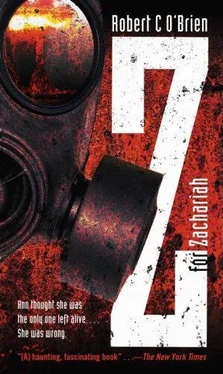
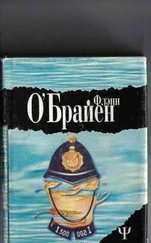
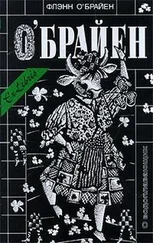
![Роберт Стайн - Дьявольская кровь на завтрак [Monster Blood For Breakfast!]](/books/27867/robert-stajn-dyavolskaya-krov-na-zavtrak-monster-thumb.webp)
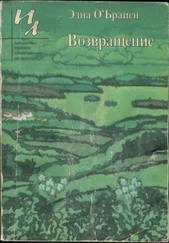
![Роберт Баден-Пауэлл - Искусство скаута-разведчика[Scouting for boys ; Искусство Разведки для мальчиков]](/books/70572/robert-baden-pauell-iskusstvo-skauta-thumb.webp)
